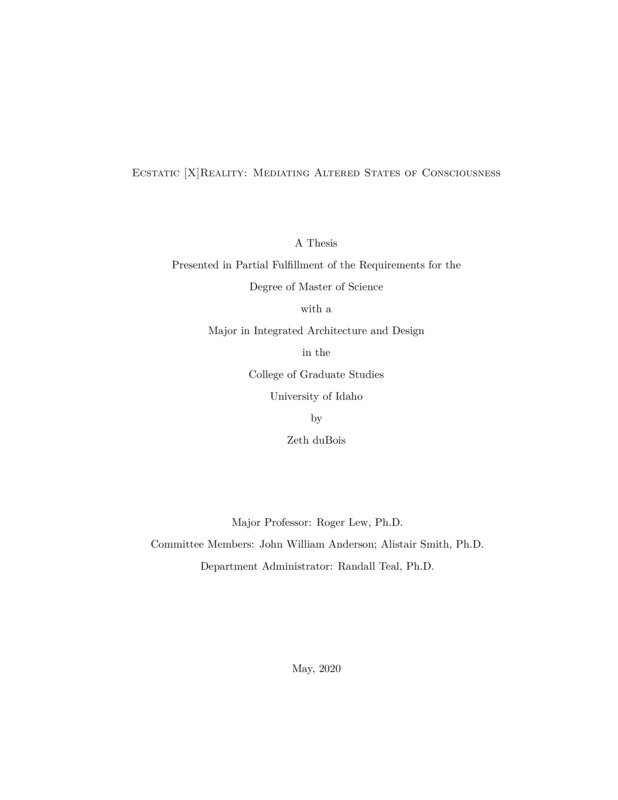Ecstatic [X]Reality: Mediating Altered States of Consciousness
Dubois, Zeth. (2020-05). Ecstatic [X]Reality: Mediating Altered States of Consciousness. Theses and Dissertations Collection, University of Idaho Library Digital Collections. https://www.lib.uidaho.edu/digital/etd/items/dubois_idaho_0089n_11785.html
- Title:
- Ecstatic [X]Reality: Mediating Altered States of Consciousness
- Author:
- Dubois, Zeth
- Date:
- 2020-05
- Embargo Remove Date:
- 2022-08-26
- Keywords:
- altered state of consciousness Augmented Reality machine learning personal discovery psychotherapy spiritualism
- Program:
- Architecture
- Subject Category:
- Personality psychology; Philosophy; Computer science
- Abstract:
-
The practice of ecstatic ritual is as ancient as human culture. With the rise of organized religion and the rational scientific revolutions, knowledge of practices and techniques faded into myth. Ecstasy can be described as a highly charged emotional state, that is both volatile and short-lived, presenting the conscious mind with inexplicable mental visions. Contemporary Western culture eschews the value of ecstatic ritual, in favor of rational problem-solving. The ecstatic experience is personal, unfathomable, and the only outward signs of its features are in the accounts of subjects relating their experiences. The ephemeral subjectivity of ecstasy presents numerous barriers for the formal investigation of the transformation of consciousness, in both scientific credo and societal acceptance.
A person may use non-invasive mental techniques of meditation, prayer, trance, and the like, to achieve an ecstatic state of mind. Ingesting psychoactive compounds can also lead to ecstasy. Until the 20th century, these processes have been primarily held to be the domain of spiritual exploration. With parallel advances of both inorganic and organic chemistry, scientists discovered psychoactive chemicals inherent in plants reacted in the brain in unforeseen ways. Further exploration of natural compounds and fully human-made laboratory chemicals revealed the existence of neurotransmitters, demonstrating that the experience of consciousness can be directed by temporarily altering brain neurochemistry.
The ecstatic experience relates to a state of perception of self in a world of sensation. It is conceivable that that deviation from ordinary frames of reference, as shown by the recordings in the stories of shamans, religious practitioners, yogis, and scientific experimentation, is central to the benefits inherited from an altered state of mind. Evidence has shown that ecstatic ritual well-conceived can have lasting therapeutic effects for mood disorders, assist in overcoming chemical addictions, and enhance overall peace of mind.
Accepting that ecstasy is a personal voyage wherein the individual reimagines itself in an altered world, is it also possible to direct the development of strictly external sensations to assist in the development of similar outcomes? This paper will explore the use of Cross Reality (XR) to craft uniquely adapted multisensory experiences. Accessing ecstasy with Ecstatic Cross Reality (EXR) offers hitherto unreachable features of altered state consciousness. Chief among them is the opportunity to be observed by third parties—which is to say, empirical, and to some degree, reproducible. Ecstatic Cross Reality (EXR) can be simultaneously a door to spiritual discovery, and a research tool into the workings of the conscious mind.
- Description:
- masters, M.S., Architecture -- University of Idaho - College of Graduate Studies, 2020-05
- Major Professor:
- Lew, Roger
- Committee:
- Smith, Alistair ; Anderson, John W
- Defense Date:
- 2020-05
- Identifier:
- Dubois_idaho_0089N_11785
- Type:
- Text
- Format Original:
- Format:
- application/pdf
- Rights:
- In Copyright - Educational Use Permitted. For more information, please contact University of Idaho Library Special Collections and Archives Department at libspec@uidaho.edu.
- Standardized Rights:
- http://rightsstatements.org/vocab/InC-EDU/1.0/

